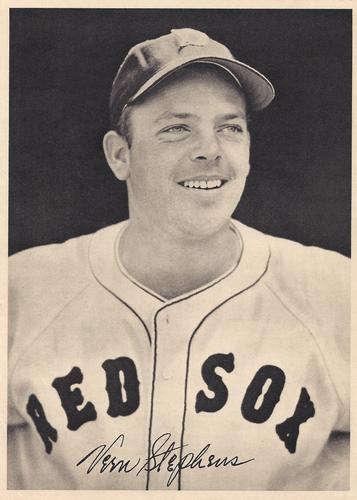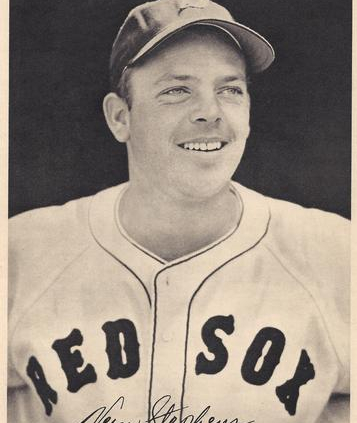August 13, 1949: Red Sox beat Senators on Vern Stephens’ walk-off grand slam in 12th inning
 In a stretch of just over a year, Boston Red Sox shortstop Vern Stephens hit two game-winning walk-off grand slams at Fenway Park – one in August 1949 and one in August 1950. They were the third and fourth such walk-off grand slams in Red Sox history.1
In a stretch of just over a year, Boston Red Sox shortstop Vern Stephens hit two game-winning walk-off grand slams at Fenway Park – one in August 1949 and one in August 1950. They were the third and fourth such walk-off grand slams in Red Sox history.1
The 28-year-old Stephens was headed for a career season when the Red Sox hosted the Washington Senators on Saturday, August 13, 1949. He had a .307 average and 29 home runs, and his 121 RBIs were the most among American and National League hitters. A day earlier, in a split doubleheader with the Senators, he had homered and driven in five runs in the first game and picked up one more RBI with a third-inning single in the second.
The Red Sox had beaten the Senators twice in the doubleheader, winning a rescheduled day game, 15-7, and then a night game, 13-11. The wins allowed Boston to climb past the Cleveland Indians in the American League standings, from third place to second, 4½ games behind the New York Yankees. The Senators were having a difficult season, and were 29 games behind New York, in seventh place. They had lost 25 of their last 29 games.
On Saturday afternoon, Red Sox manager Joe McCarthy selected Ellis Kinder to start. Kinder was enjoying the best season of his career; despite a pedestrian 4.38 ERA, he was already 13-5 in his fourth big-league campaign – at age 34.2 Washington manager Joe Kuhel countered with veteran left-hander Mickey Harris. Harris was 32 years old and had spent his entire six-season major-league career with the Red Sox until a June 13 trade sent him to the Senators.3
Washington scored in the top of the first. After one out, second baseman Sherry Robertson and right fielder Sam Mele (traded with Harris in June) singled. Robertson held at second on Mele’s hit but stole third while right fielder Roberto Ortiz was at bat. Ortiz then reached on an infield single to third base, as Robertson scored. Center fielder Clyde Vollmer’s single loaded the bases, but the threat was squelched when first baseman Eddie Robinson grounded into a 4-6-3 double play – the first of a total of six twin killings the teams turned.
Washington added nine more singles over the following 11 innings but never scored another run against Kinder. Every one of the Senators’ 13 hits was a single.
In the bottom of the first, Harris walked center fielder Dom DiMaggio and, with one out, left fielder Ted Williams, but Stephens grounded into a 6-4-3 double play.
Both teams singled once in the second, but there was no scoring. Senators shortstop Sam Dente hit a leadoff single, but DiMaggio threw him out when he tried to go for two bases.
The Senators put two on in the third, thanks to an error and then another single by Robertson. Nothing came of it. Kinder pitched a scoreless frame in the third and again in the fourth.
In the Washington fifth, Harris led off with a single and Eddie Yost followed with another. After Robertson struck out, Mele hit a fly ball deep enough to center that Harris tagged and took third.
When left fielder Ortiz hit a ball hard, both baserunners were off running and likely would have scored but for a “sensational catch by Williams off the left-field wall.”4 He slammed into the wall with a loud bang but held up his glove, showing the ball inside. The Senators protested that the ball had hit the wall first, but the umpires ruled it a catch.
Vollmer singled to lead off the Senators’ sixth but was caught attempting a steal of second.
The first Red Sox run of the game came in the bottom of the sixth. Ted Williams hit a slow roller to first base, a single, “so easy that Robinson couldn’t handle it.”5 After Stephens flied out, second baseman Bobby Doerr walked. Right fielder Al Zarilla picked up his second single of the game, hitting one to right-center field. Williams scored from second to tie the game; Doerr and Zarilla moved up a base when Mele bobbled the ball for an error.
Boston had a chance to go ahead with runners at second and third and one out, and Kuhel brought in Joe Haynes to replace Harris. Catcher Birdie Tebbetts grounded to Yost at third and Doerr was tagged out in a rundown. First baseman Billy Hitchcock grounded into a force play at second.
The first two Senators singled off Kinder in the top of the seventh, but a force play at second and another double play squelched that.
For only the second time in the game, Kinder retired the Senators in order in the eighth. In the bottom of the inning, Doerr singled with one out, but Zarilla hit into a 3-6-3 double play.
Both teams had misadventures on the bases in the ninth inning. In the top of the ninth, the weather turned bad enough to prompt a 35-minute rain delay. When play resumed, Robinson reached on Doerr’s error, but Dente fouled out to first base and Tebbetts threw out Robinson to complete a strike-’em-out, throw-’em-out double play. With two outs in the bottom of the ninth, Kinder singled to left, but Ortiz gunned him down trying to stretch it into a double.
Haynes was the first batter for Washington in the top of the 10th, and he singled to left, but none of the next three Senators got the ball out of the infield. All three Boston batters grounded out in the bottom of the inning.
Kinder retired the Senators in order in the top of the 11th. Vern Stephens led off for the Red Sox and popped up to second base. Doerr and Zarilla both singled but the next two batters grounded out.
Dente singled to lead off the Washington 12th. In fact, the Washington Evening Star noted that “eight times in the last 11 innings the Nats’ first batter reached first base.”6 Dente was dutifully sacrificed to second by catcher Jake Early. Haynes was due up next and allowed to hit for himself.7 Kinder struck him out. Yost drew a walk, the only base on balls Kinder yielded all game. Robertson hit a fly ball hauled in by DiMaggio in deep center field.
Kinder himself was the first batter up in the bottom of the 12th.8 He drew a base on balls, on four pitches. DiMaggio sacrificed Kinder to second base, and then the Red Sox pitcher tried to take third on Johnny Pesky’s “easy grounder” to shortstop Dente.
It looked like another baserunning blunder, but, as the Washington Post reported, “All set to throw to Eddie Yost at third base, to nail Kinder for the second out, Dente overlooked the formality of fielding the ball before throwing it.”9 The Red Sox had runners at the corners and one out.
Ted Williams stepped into the batter’s box. He was walked intentionally 258 times in the course of his career; this was one of those times. The bases were loaded.
Vern Stephens came to the plate. Although he was 0-for-5 in this game, he had been on a tear, with 17 RBIs already during the first 12 days of August, including six the day before.
“A raw drizzle was still descending, and making conditions difficult,” observed the Boston Globe.10
Stephens swung at the first pitch and hit it hard, over the left-field wall and into the screen against the wind.11 The grand slam gave him 125 RBIs and 30 home runs – and gave the Red Sox a 5-1 win.
Despite the rain, Ted Williams (“Big Slug” in Globe parlance) waited at the plate to greet “Little Slug,” dubbed “a rare public demonstration of delight by Williams.”12 It was Stephens’ second grand slam of the 1949 season and the eighth of his career.13
Kinder earned the win, improving to 14-5. He finished 1949 with a record of 23-6, the best won-lost percentage in the American or National League. He could also boast an AL- and NL-leading six shutouts. In 17 appearances from July 28 through the end of the season, Kinder had a 1.87 ERA, dropping his final mark to 3.36.
On August 24, 1950, 12 months after beating the Senators, Stephens hit another walk-off grand slam, in the ninth against the St. Louis Browns. Through the 2023 season, Stephens is the only Red Sox player to have twice hit grand slams to immediately end a game.
Acknowledgments
This article was fact-checked by Harrison Golden and copy-edited by Len Levin.
Photo credit: Vern Stephens, Trading Card Database.
Sources
In addition to the sources cited in the Notes, the author consulted Baseball-Reference.com and Retrosheet.org.
https://www.baseball-reference.com/boxes/BOS/BOS194908130.shtml
https://www.retrosheet.org/boxesetc/1949/B08130BOS1949.htm
Notes
1 Through the 2023 season, 22 Red Sox batters have hit walk-off grand slams. The first was hit by Jimmie Foxx on August 23, 1938, and the second by Jake Jones on June 15, 1947.
2 Kinder did famously attract the nickname “Old Folks.”
3 He’d been 43-42 (3.92) for the Red Sox. Harris had been 2-3 (4.54) when traded. He’d lost six games for the Senators and came into this game with a record of 2-9 (5.03). Though he didn’t bear the loss in this game, he finished the season a disappointing 4-15 (5.02). In 1950 the Senators converted him to a reliever, and he led the league in appearances, albeit with a 4.78 ERA.
4 Burton Hawkins, “Stephens’ 4-Run Homer in 12th Sinks Nats, 5 to 1,” Washington Evening Star, August 14, 1949: B1.
5 Hy Hurwitz, “Stephens’ Slam in 12th Defeats Washington, 5-1,” Boston Globe, August 14, 1949: C1.
6 Hawkins.
7 Haynes was a .213 career hitter.
8 Looking back at his full career, Kinder was a .142 hitter.
9 “Harris Starter; Griffs Pound Kinder for 13 Hits,” Washington Post, August 14, 1949: C1.
10 Hurwitz.
11 Howard W. Robbins, “Vern Stephens Delivers Grand Slammer in 12th,” Springfield (Massachusetts) Union, August 14,1949: B1.
12 Hurwitz wrote, “The Kid means well, but it’s sometimes hard for him to show it in front of the fans. He’s afraid it might be misinterpreted.”
13 Stephens had also hit a grand slam on April 23 against Fred Sanford of the Yankees. Ten of Stephens’ 247 career homers in 15 major-league seasons were grand slams.
Additional Stats
Boston Red Sox 5
Washington Senators 1
12 innings
Fenway Park
Boston, MA
Box Score + PBP:
Corrections? Additions?
If you can help us improve this game story, contact us.


